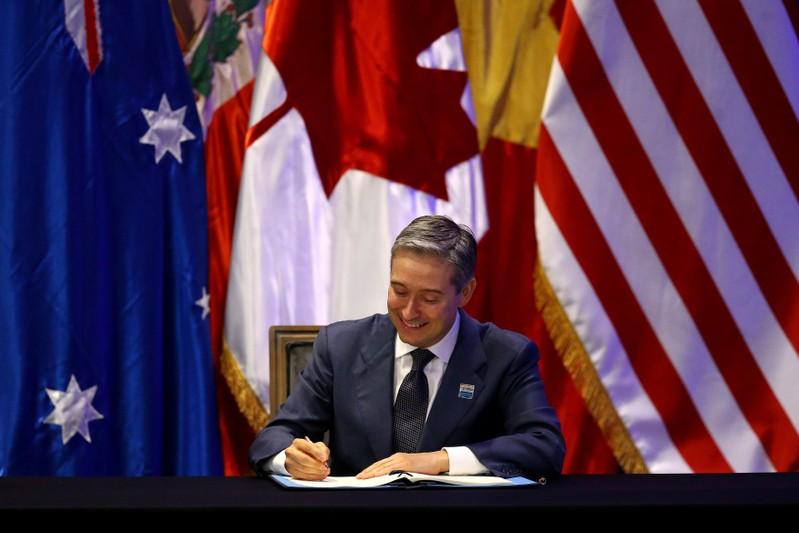SANTIAGO - Eleven countries including Vietnam, Japan and Canada signed a landmark Asia-Pacific trade agreement without the United States on Thursday in what one minister called a powerful signal against protectionism and trade wars.
The deal came as U.S. President Donald Trump vowed earlier in the day to press ahead with a plan to impose tariffs on steel and aluminum imports, a move that other nations and the International Monetary Fund said could start a global trade war.
The Comprehensive and Progressive Agreement for Trans-Pacific Partnership (CPTPP) will reduce tariffs in countries that together amount to more than 13 percent of the global economy - a total of $10 trillion in gross domestic product. With the United States, it would have represented 40 percent.
“Today, we can proudly conclude this process, sending a strong message to the international community that open markets, economic integration and international cooperation are the best tools for creating economic opportunities and prosperity,” said Chilean President Michelle Bachelet.
Heraldo Munoz, Chile’s minister of foreign affairs, said he expected Chile’s trade with China, its top trading partner, to continue growing alongside trade with CPTPP countries.
Even without the United States, the deal will span a market of nearly 500 million people, making it one of the world’s largest trade agreements, according to Chilean and Canadian trade statistics.
The original 12-member agreement, known as the Trans-Pacific Partnership (TPP), was thrown into limbo early last year when Trump withdrew from the deal three days after his inauguration. He said the move was aimed at protecting U.S. jobs.
The 11 remaining nations finalized a revised trade pact in January. That agreement will become effective when at least six member nations have completed domestic procedures to ratify it, possibly before the end of the year.
“We are very hopeful like others that we will see the CP TPP coming into effect about the end of the year or shortly thereafter,” said Australia Trade Minister Steven Ciobo.
'The way forward'
The revised agreement eliminates some requirements of the original TPP demanded by U.S. negotiators, including rules to ramp up intellectual property protection of pharmaceuticals. Governments and activists of other member nations worry the changes will raise the costs of medicine.
The final version of the agreement was released in New Zealand on Feb. 21. The member countries are Australia, Brunei, Canada, Chile, Japan, Malaysia, Mexico, New Zealand, Peru, Singapore and Vietnam.
“We’re proud ... to show the world that progressive trade is the way forward, that fair, balanced, and principled trade is the way forward, and that putting citizens first is the way forward for the world when it comes to trade,” Canadian Trade Minister Francois-Phillippe Champagne said.
In January, Trump, who also has threatened to pull the United States out of the North American Free Trade Agreement, told the World Economic Forum in Switzerland that it was possible Washington might return to the TPP pact if it got a better deal. However, New Zealand’s trade minister said that was unlikely in the near term, while Japan has said altering the agreement now would be very difficult.
On Thursday, Munoz said CPTPP was not an agreement against anyone and several governments had said they want to join it.
Trump vowed on Thursday to impose a 25 percent tariff on steel imports and 10 percent tariff on aluminum imports, although he said there would be exemptions for NAFTA partners Mexico and Canada.
He announced the plan for tariffs last week, rattling financial markets.
Mexican Economy Minister Ildefonso Guajardo, in Santiago for the CPTPP signing, told Reuters he would not allow the United States to use the tariffs to pressure it in the NAFTA talks.
Champagne told Reuters that Canada would not accept duties or quotas from the United States.


















































